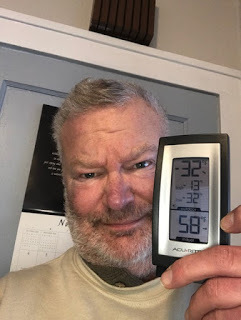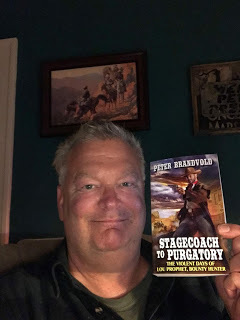Peter Brandvold's Blog, page 2
January 30, 2019
The Winter of My First Library Card
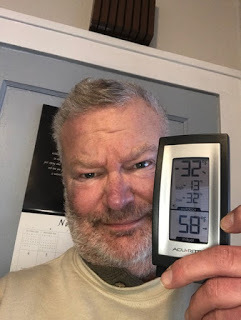
THE WINTER OF MY FIRST LIBRARY CARD
Colder’n a grave-digger’s behind here this winter! Or a banker’s heart… Anyway…it got me thinking that I may not have become a writer if I’d grown up somewhere warm. What made me fall in love with reading was warming up in the Leach Public Library in Wahpeton, North Dakota, back in the 1970s when I was delivering newspapers—both the Wahpeton Daily Newsand the Fargo Forum. Before I started the fifth grade, I wasn’t all that big on reading. I preferred comic books when I could find them, and television—westerns and Star Trek.In the fifth grade, however, our English textbook was filled with many great stories that I really tumbled for. Some that I remember best were: “In Another Country,” by Ernest Hemingway, “Beware of the Dog,” by Roald Dahl, and “Wine on the Desert” by Max Brand. One Friday afternoon, during our private reading time, my teacher passed out an issue of Scholastic Magazineentirely devoted to Jack London stories including “Odyssey of the North,” “The White Silence,” and my all-time favorite story by anyone--“To Build a Fire.” I can still see the atmospheric pencil illustrations that accompanied those tales arranged in clean columns of black type, and I can smell the slightly musty, acidic smell of the pulp paper they were printed on.Reading for me has always been a multi-sensory experience involving not just the narrative evoked by the words but by the ink and paper and glue they’re printed on, as well as what I’m hearing and seeing around me while I’m reading, and even my mood. To this day I can’t reread “To Build a Fire” without remembering the creaking and knocking of the radiators in that fifth-grade Central Junior High classroom in which I’d first read the tale, and the fruity smell of the purple bubblegum someone had stuck to one of those tired old heaters. I also remember the feeling of warmth and security I’d felt as I read those words, and the simple joy that rose in me from the sensual magic of living inside a story.Those first narratives whetted my appetite for more, but I’m not sure I would have continued reading on my own unless I’d started stopping at the library on cold winter evenings midway through my nightly newspaper route. The library in Wahpeton was strategically located about halfway through my journey, and by the time I got that far my toes were usually numb inside my snowmobile boots, and Jack Frost was chomping down hard on my nose.So, with my ink-stained canvas satchel hanging off my shoulder, I’d clomp up the wide stone steps in my heavy winter boots, and enter the regal, high-ceilinged and varnished halls of the library. At first, the building was intimidating. It was so clean and quiet, and there was all that wood and the smell of varnish and books, and older people sitting around concentrating and whispering. There was an off-putting church-like quality. A backsliding Lutheran even then, I’d had my fill of churches.The librarians always made me a little panicky. I still remember them vividly, as if I’d seen them only last week. There were three—two older ladies, one with immaculately coifed gray hair, and another with dyed brown hair. Both were heavy, and they breathed heavily and wore lots of makeup and jewelry and perfume whose cloying scents dogged you throughout the building. The daughter of one of the older women—the gray-haired one, I think--worked behind that long, blond oak desk, as well. While she was much younger, she still had a rather intimidating forthrightness about her. She was slender and pretty. She dressed in flannel shirts and jeans and wore wire-rimmed glasses, giving her a vaguely hippie air, but, like the others, she seemed a little fed up, and she rarely smiled.Still, later, when I’d summoned the courage to ask for a library card and to begin checking out books, the young librarian was the only one I would go to when I wanted to check out Mickey Spillane novels. She never batted an eye. The two older ladies always made it known with grunts and chuffs and severe furlings of their brows and pursings of their lips what they thought of lowbrow literature--especially in the hands of a twelve-year-old paperboy--which has always been a staple of mine. I remember one of them flatly refusing to let me check out Fear of Flying by Erica Jong, though that only made me want to read it more, which I eventually did, by god.When I first started warming up in the library, that’s about all I did. I’d slink off to a far corner, sit down in a creaky wooden Windsor chair, and tap my boots until I started to feel my toes again. Eventually, I started to while away the time by picking up a book here or there. I’d choose at random musty old books or the shiny new paperbacks displayed on the spinner racks near where the magazines were displayed and a few old chairs and sofas were arranged. That was where the old men sat in their unzipped rubber galoshes, reading Louis L’Amour westerns, occasionally honking into their hankies and smelling like sweat and tobacco. Little by little, cold night after cold night, those narratives would lure me in, and I’d find myself sitting there reading The Martian Chronicles, The Grapes of Wrath, The Girl Hunters, Martin Eden, Jaws, or The Bell Jar, until I realized I was sweating inside my longjohns, and my feet were so hot they felt like melting plastic.I had to face facts. I couldn’t limit my reading to the library anymore. The heat was killing me. I had to summon my courage to walk up to that long, blond, oak desk and ask one of those surly women to go to the trouble of typing out a library card for this snot-nosed urchin.My very own card!I was assured by my teachers at school I was allowed one, though I for some reason didn’t think that I, a scruffy ink-stained paperboy with loud snow boots and a bad cowlick, really deserved one. What’s more, I didn’t think the library ladies would think I did, either.I wanted to take books home in the worst way, so I could continue reading in the privacy of my basement lair, with only the sump pump to pester me. Eventually, rehearsing the query over and over in my head, I worked up the courage to take that long, slow walk to the long, blond, oak desk behind which the old ladies muttered furtively as they checked in books, processed new ones, gently remonstrated the younger librarian, brewed coffee in a gurgling urn, and nibbled brownies. I felt like Tom Horn being led to the gallows.The gray-haired lady reeking of too much perfume didn’t seem to approve of my last name; she kept spelling it wrong and huffing and puffing as she ripped the card out of the old Royal to start over with a weary sigh. Eventually, my very own personal library card, with my name spelled correctly, resided in my wallet. It was the only thing in there for several more years. It gave me respectability, at least in my own eyes. And it became my passport to the world of reading and writing for the rest of my life.
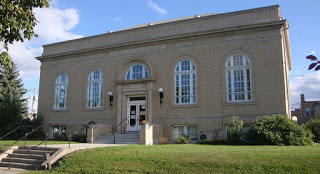
Published on January 30, 2019 09:29
THE WINTER OF MY FIRST LIBRARY CARDColder’n a grave-digge...

THE WINTER OF MY FIRST LIBRARY CARD
Colder’n a grave-digger’s behind here this winter! Or a banker’s heart… Anyway…it got me thinking that I may not have become a writer if I’d grown up somewhere warm. What made me fall in love with reading was warming up in the Leach Public Library in Wahpeton, North Dakota, back in the 1970s when I was delivering newspapers—both the Wahpeton Daily Newsand the Fargo Forum. Before I started the fifth grade, I wasn’t all that big on reading. I preferred comic books when I could find them, and television—westerns and Star Trek.In the fifth grade, however, our English textbook was filled with many great stories that I really tumbled for. Some that I remember best were: “In Another Country,” by Ernest Hemingway, “Beware of the Dog,” by Roald Dahl, and “Wine on the Desert” by Max Brand. One Friday afternoon, during our private reading time, my teacher passed out an issue of Scholastic Magazineentirely devoted to Jack London stories including “Odyssey of the North,” “The White Silence,” and my all-time favorite story by anyone--“To Build a Fire.” I can still see the atmospheric pencil illustrations that accompanied those tales arranged in clean columns of black type, and I can smell the slightly musty, acidic smell of the pulp paper they were printed on.Reading for me has always been a multi-sensory experience involving not just the narrative evoked by the words but by the ink and paper and glue they’re printed on, as well as what I’m hearing and seeing around me while I’m reading, and even my mood. To this day I can’t reread “To Build a Fire” without remembering the creaking and knocking of the radiators in that fifth-grade Central Junior High classroom in which I’d first read the tale, and the fruity smell of the purple bubblegum someone had stuck to one of those tired old heaters. I also remember the feeling of warmth and security I’d felt as I read those words, and the simple joy that rose in me from the sensual magic of living inside a story.Those first narratives whetted my appetite for more, but I’m not sure I would have continued reading on my own unless I’d started stopping at the library on cold winter evenings midway through my nightly newspaper route. The library in Wahpeton was strategically located about halfway through my journey, and by the time I got that far my toes were usually numb inside my snowmobile boots, and Jack Frost was chomping down hard on my nose.So, with my ink-stained canvas satchel hanging off my shoulder, I’d clomp up the wide stone steps in my heavy winter boots, and enter the regal, high-ceilinged and varnished halls of the library. At first, the building was intimidating. It was so clean and quiet, and there was all that wood and the smell of varnish and books, and older people sitting around concentrating and whispering. There was an off-putting church-like quality. A backsliding Lutheran even then, I’d had my fill of churches.The librarians always made me a little panicky. I still remember them vividly, as if I’d seen them only last week. There were three—two older ladies, one with immaculately coifed gray hair, and another with dyed brown hair. Both were heavy, and they breathed heavily and wore lots of makeup and jewelry and perfume whose cloying scents dogged you throughout the building. The daughter of one of the older women—the gray-haired one, I think--worked behind that long, blond oak desk, as well. While she was much younger, she still had a rather intimidating forthrightness about her. She was slender and pretty. She dressed in flannel shirts and jeans and wore wire-rimmed glasses, giving her a vaguely hippie air, but, like the others, she seemed a little fed up, and she rarely smiled.Still, later, when I’d summoned the courage to ask for a library card and to begin checking out books, the young librarian was the only one I would go to when I wanted to check out Mickey Spillane novels. She never batted an eye. The two older ladies always made it known with grunts and chuffs and severe furlings of their brows and pursings of their lips what they thought of lowbrow literature--especially in the hands of a twelve-year-old paperboy--which has always been a staple of mine. I remember one of them flatly refusing to let me check out Fear of Flying by Erica Jong, though that only made me want to read it more, which I eventually did, by god.When I first started warming up in the library, that’s about all I did. I’d slink off to a far corner, sit down in a creaky wooden Windsor chair, and tap my boots until I started to feel my toes again. Eventually, I started to while away the time by picking up a book here or there. I’d choose at random musty old books or the shiny new paperbacks displayed on the spinner racks near where the magazines were displayed and a few old chairs and sofas were arranged. That was where the old men sat in their unzipped rubber galoshes, reading Louis L’Amour westerns, occasionally honking into their hankies and smelling like sweat and tobacco. Little by little, cold night after cold night, those narratives would lure me in, and I’d find myself sitting there reading The Martian Chronicles, The Grapes of Wrath, The Girl Hunters, Martin Eden, Jaws, or The Bell Jar, until I realized I was sweating inside my longjohns, and my feet were so hot they felt like melting plastic.I had to face facts. I couldn’t limit my reading to the library anymore. The heat was killing me. I had to summon my courage to walk up to that long, blond, oak desk and ask one of those surly women to go to the trouble of typing out a library card for this snot-nosed urchin.My very own card!I was assured by my teachers at school I was allowed one, though I for some reason didn’t think that I, a scruffy ink-stained paperboy with loud snow boots and a bad cowlick, really deserved one. What’s more, I didn’t think the library ladies would think I did, either.I wanted to take books home in the worst way, so I could continue reading in the privacy of my basement lair, with only the sump pump to pester me. Eventually, rehearsing the query over and over in my head, I worked up the courage to take that long, slow walk to the long, blond, oak desk behind which the old ladies muttered furtively as they checked in books, processed new ones, gently remonstrated the younger librarian, brewed coffee in a gurgling urn, and nibbled brownies. I felt like Tom Horn being led to the gallows.The gray-haired lady reeking of too much perfume didn’t seem to approve of my last name; she kept spelling it wrong and huffing and puffing as she ripped the card out of the old Royal to start over with a weary sigh. Eventually, my very own personal library card, with my name spelled correctly, resided in my wallet. It was the only thing in there for several more years. It gave me respectability, at least in my own eyes. And it became my passport to the world of reading and writing for the rest of my life.

Published on January 30, 2019 09:29
Greetings From Frostbite Falls, Minnesota!
Published on January 30, 2019 07:39
November 19, 2018
Lou Prophet Rides Again...all through the year!
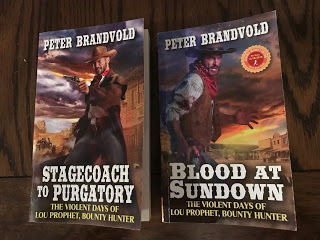
The book on the left came out a couple months ago. The one on the right will be out in a month. The one on the left is being discounted to 1.99 from 11/25-1/6 to help promote the masterpiece on the right. So on the 25th, take a break from the family drama and go over to Amazon and pick Mean Pete's pockets. Make him hoppin' mad! He really hates gettin' fleeced like that!! (SUNDOWN is entirely new, by the way. Never before published anywhere. An entirely new book...er, masterpiece.)
I'll be posting an excerpt from BLOOD AT SUNDOWN on Thanksgiving.
The third book, THE COST OF DYING, will be out next July but it's available for pre-order now.
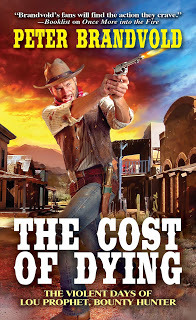
Published on November 19, 2018 04:51
October 22, 2018
Sand Dune Saloon, MacLeod, North Dakota
Yesterday, Sunday October 22, 2018, was a great day for a road trip. My friend and old (but still young!) schoolmate, Mary Altoff, and I hopped in my Ford truck and motored on over to the Cheyenne River country in eastern North Dakota, about an hour's drive west of my old hometown of Wahpeton, on the Red River of the North. A great time was had by us both. The beer was cold and the pizza tasty at the Sand Dune Saloon in MacLeod.



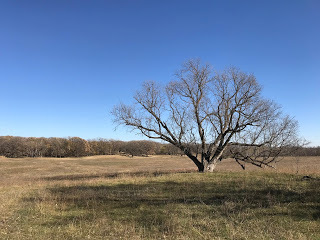

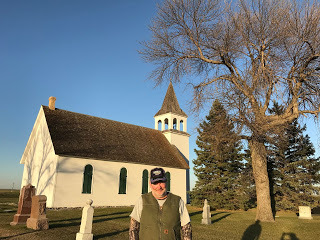
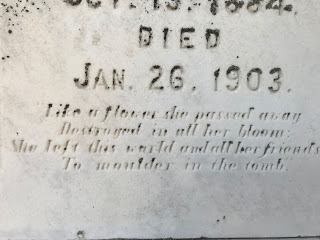
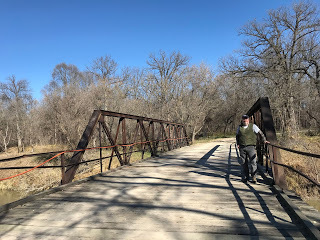
Published on October 22, 2018 04:44
October 7, 2018
Fourth and Final Book in the Bloody Arizona Series Now Here!
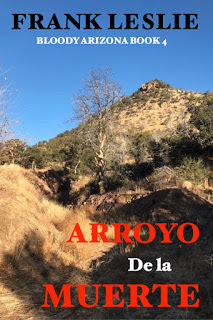
SADDLE UP FOR A HARD RIDE WITH THE HALF-BREED DRIFTER, YAKIMA HENRY, IN THE FOUR-PART SERIES...BLOODY ARIZONA!
In this final volume, Book 4—ARROYO DE LA MUERTE (CANYON OF DEATH)—Yakima Henry is once again Town Marshal of Apache Springs, Arizona. Not an easy job, for Apache Springs is booming and the railroad has come to town. Badmen outnumber the lawmen by a thousand to three.
Yakima’s job gets all the harder when someone kills a prominent businessman and siccs two kill-crazy assassins on Yakima himself. Turns out that’s the least of his worries, for someone else sends even more killers bent on turning him toe-town. Yakima would like to know why.
It seems to be tied to the fact that the mysterious, treasure-laden canyon southwest of Apache Springs is being the target of more and more gold-hungry men searching for their own El Dorados. However, according to the beautiful young desert rat, Emma Kosgrove, the canyon was cursed by an Apache witch. The removal of the treasure would release the curse from the canyon and wreak havoc across the land. Throw the two beautiful Kosgrove sisters into Yakima’s mess, both of whom want Yakima for her own, and one who is determined to keep the treasure-laden canyon a secret or die trying, you have one hell of a blood-splashed, wild-assed tale on your hands!
GET YOUR COPY AT AMAZON!
Published on October 07, 2018 05:09
September 28, 2018
Stagecoach to Purgatory--A Lou Prophet Oater!
Published on September 28, 2018 19:52
August 27, 2018
Stagecoach to Purgatory Now Available!
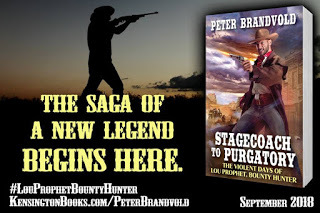
From The Life and Times of Lou Prophet, Bounty Hunter by HEYWOOD WILDEN SCOTT
I’d been a tough-nosed newsman for nearly sixty years, yet it was with more trepidation than I like to admit that I knocked on the big, old rebel’s door.
I’d heard the stories about him. Hell, I’d printed many of those yarns in the various newspapers I’d written and edited in that grand old time of the Old West gunfighters, larger-than-life lawmen, and the much-maligned, death-dealing bounty hunters, of which he’d been one.
Yes, I’d heard the tales. I’d printed the tales. With feigned reluctance (I was a journalist, after all— not a reader or writer of dime novels!) but with unabashed delight, if the truth be known. With ad- miration and even envy. Imagine such a man living such a life at such a time, hoorawing badmen of every stripe, risking life and limb with every adventure while the rest of us suffered little more than festering galls to our posteriors while scribbling ink by the barrel onto endless rolls of foolscap in dingy, smoky, rat-infested offices off backstreet alleys, the big presses making the whole building rock.
I’d never met him.
I’d heard from those who had crossed his trail that he was a formidable, mercurial cuss, by turns kindhearted and generous and foulmouthed and dangerous, and he’d grown more and more formidable, unpredictable, and recalcitrant with age. The years had not been kind to him. But, then, what would you expect of a man who had lived such a life and who, it was said, had sold his soul to the devil, ex- changing an eternity of coal-shoveling in hell’s bowels for a few good years after the War Between the States “on this side of the sod, stomping with his tail up,” as he was known to call what he did between his bounty hunting adventures?
In fact, I once heard that he’d hunted only men with prices on their heads in order to pay for his notorious appetite for whiskey, women, and poker.
He’d seen so much killing during the war, out of which he’d emerged something of a hero of the Con- federacy, that he really wanted only to dance and make love and swill the Taos Lightning to his heart’s delight. But he was not an independently wealthy man, so it was only with great reluctance, I’m told, that after such bouts of manly indiscretions he took up his Colt .45, his Winchester ’73 rifle, his double- bore, sawed-off, twelve-gauge Richards coach gun, and his razor-edged bowie knife, and stepped into the saddle of his beloved but appropriately named horse, Mean and Ugly, and fogged the sage in pur- suit of death-dealing curly wolves prowling the long coulees of the wild and woolly western frontier.
He usually had a fresh wanted circular or two stuffed into his saddlebag pouches, carelessly ripped from post office or Wells Fargo bulletin boards.
Now, as I rolled my chair up to his room, I’d recently seen for myself that he was every bit the colorful albeit formidable old codger I’d heard he was. It had been only within a week or so of this recounting that the old warrior had shown up at the same Odd Fellows House of Christian Charity in Pasadena, California, that I, too, after several grave illnesses had broken me both financially and spiritually, had found myself shut away in, whiling away the long, droll hours until my own annihilation.
He’d been working as a consultant in the silent western flickers, I’d heard, until a grievous accident involving a Chrysler Model B-70, a couple of pretty starlets, and several jugs of corn liquor caromed off a perilous mountain road in the hills above Malibu. Now he prowled the halls on crutches—a big, one- legged man with a face like the siding of a ruined barn, at times grunting and bellowing blue curses (especially when one of the attendants confiscated his proscribed cigarettes and whiskey) or howling songs of the old Confederacy out on the narrow balcony off his second-story room, his raspy voice ratcheting up out of his tar-shrunken lungs like the engines of the horseless carriages sputtering past on Pacific Avenue.
As I was saying, I knocked on his door.
I shrank back in my chair when the door was flung open and the big bear of the one-legged man, broad as a coal dray and balancing precariously on one crutch, peered out from the roiling smoke fog inun- dating his tiny, sparsely furnished room.
“What?” he said.
At least, that’s how I’m translating it. It actually sounded more like the indignant grunt of a peevish grizzly bear prodded from a long winter’s slumber.
Out of that ruin of a face, two pale blue eyes burned like the last stars at the end of the night. At once keen and bold, flickering and desperate.
Wedged between my left thigh and the arm of my wheelchair was a bottle of rye whiskey. On my right leg were a fresh notepad, a pen, and a bottle of ink. I hoisted the bottle high, grinned up at the old roarer scowling down at me, a loosely rolled cigarette drooping from a corner of his broad mouth, and said, “Tell me a story, Lou!”
Purchase From Amazon Here
Published on August 27, 2018 04:37
Stagecoach to Purgatory Excerpt

From The Life and Times of Lou Prophet, Bounty Hunter by HEYWOOD WILDEN SCOTT
I’d been a tough-nosed newsman for nearly sixty years, yet it was with more trepidation than I like to admit that I knocked on the big, old rebel’s door.
I’d heard the stories about him. Hell, I’d printed many of those yarns in the various newspapers I’d written and edited in that grand old time of the Old West gunfighters, larger-than-life lawmen, and the much-maligned, death-dealing bounty hunters, of which he’d been one.
Yes, I’d heard the tales. I’d printed the tales. With feigned reluctance (I was a journalist, after all— not a reader or writer of dime novels!) but with unabashed delight, if the truth be known. With ad- miration and even envy. Imagine such a man living such a life at such a time, hoorawing badmen of every stripe, risking life and limb with every adventure while the rest of us suffered little more than festering galls to our posteriors while scribbling ink by the barrel onto endless rolls of foolscap in dingy, smoky, rat-infested offices off backstreet alleys, the big presses making the whole building rock.
I’d never met him.
I’d heard from those who had crossed his trail that he was a formidable, mercurial cuss, by turns[image error][image error]
kindhearted and generous and foulmouthed and dangerous, and he’d grown more and more formida- ble, unpredictable, and recalcitrant with age. The years had not been kind to him. But, then, what would you expect of a man who had lived such a life and who, it was said, had sold his soul to the devil, ex- changing an eternity of coal-shoveling in hell’s bowels for a few good years after the War Between the States “on this side of the sod, stomping with his tail up,” as he was known to call what he did between his bounty hunting adventures?
In fact, I once heard that he’d hunted only men with prices on their heads in order to pay for his notorious appetite for whiskey, women, and poker.
He’d seen so much killing during the war, out of which he’d emerged something of a hero of the Con- federacy, that he really wanted only to dance and make love and swill the Taos Lightning to his heart’s delight. But he was not an independently wealthy man, so it was only with great reluctance, I’m told, that after such bouts of manly indiscretions he took up his Colt .45, his Winchester ’73 rifle, his double- bore, sawed-off, twelve-gauge Richards coach gun, and his razor-edged bowie knife, and stepped into the saddle of his beloved but appropriately named horse, Mean and Ugly, and fogged the sage in pur- suit of death-dealing curly wolves prowling the long coulees of the wild and woolly western frontier.
He usually had a fresh wanted circular or two stuffed into his saddlebag pouches, carelessly ripped from post office or Wells Fargo bulletin boards.
Now, as I rolled my chair up to his room, I’d re- cently seen for myself that he was every bit the colorful albeit formidable old codger I’d heard he was. It had been only within a week or so of this recounting that the old warrior had shown up at the same Odd Fellows House of Christian Charity in Pasadena, California, that I, too, after several grave illnesses had broken me both financially and spiritually, had found myself shut away in, whiling away the long, droll hours until my own annihilation.
He’d been working as a consultant in the silent western flickers, I’d heard, until a grievous accident involving a Chrysler Model B-70, a couple of pretty starlets, and several jugs of corn liquor caromed off a perilous mountain road in the hills above Malibu. Now he prowled the halls on crutches—a big, one- legged man with a face like the siding of a ruined barn, at times grunting and bellowing blue curses (especially when one of the attendants confiscated his proscribed cigarettes and whiskey) or howling songs of the old Confederacy out on the narrow balcony off his second-story room, his raspy voice ratcheting up out of his tar-shrunken lungs like the engines of the horseless carriages sputtering past on Pacific Avenue.
As I was saying, I knocked on his door.
I shrank back in my chair when the door was flung open and the big bear of the one-legged man, broad as a coal dray and balancing precariously on one crutch, peered out from the roiling smoke fog inun- dating his tiny, sparsely furnished room.
“What?” he said.
At least, that’s how I’m translating it. It actually sounded more like the indignant grunt of a peevish grizzly bear prodded from a long winter’s slumber.
Out of that ruin of a face, two pale blue eyes burned like the last stars at the end of the night. At once keen and bold, flickering and desperate.
Wedged between my left thigh and the arm of my wheelchair was a bottle of rye whiskey. On my right leg were a fresh notepad, a pen, and a bottle of ink. I hoisted the bottle high, grinned up at the old roarer scowling down at me, a loosely rolled cigarette drooping from a corner of his broad mouth, and said, “Tell me a story, Lou!”
Purchase From Amazon Here
Published on August 27, 2018 04:37
August 19, 2018
Bear Haskell Rides!
NOW AVAILABLE IN BEAUTIFUL HARDCOVER AND EBOOK FROM FIVE STAR!
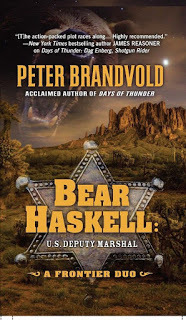
Two western novels featuring Bear Haskell, U.S. Deputy Marshal, who rides for Chief Marshal Henry Dade out of Denver’s First District Court. Haskell’s a former Union war hero and Pinkerton agent, a big man over six and a half feet tall and as broad as a barn door. He wears a necklace of bear claws taken from the grizzly that almost had him for supper. That’s the kind of man bear is. He holds a grudge and he gives no quarter—to grizzly bears or men. In these two rapid-fire westerns, Bear is given the nasty assignment of going after the man or men who backshot an old lawman friend; then, in the second book, of heading down to Texas to hunt a notorious, mysterious, and cruelly cunning killer known as “the Jackal.”
The two novels in this volume are the first two in my Bear Haskell series. The other two, available as ebooks at Amazon, will be available soon in a handsome hardcover--as well as professionally edited ebook--next year. These are rough and rowdy tales, with all the sex and violence galloping around in its rowdy writer's heart!!
Purchase Here From Amazon
Published on August 19, 2018 12:17

